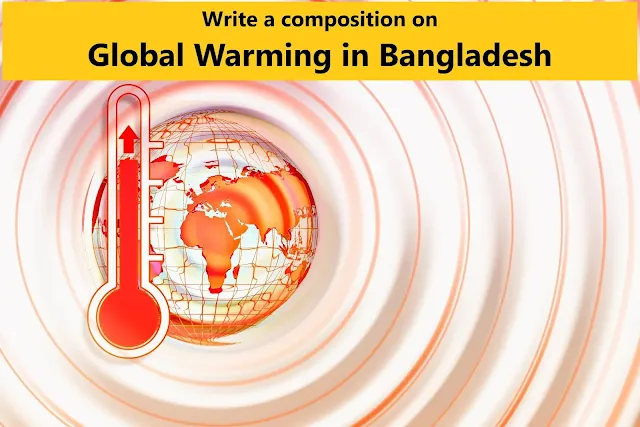Write a composition on Global Warming in Bangladesh
Global Warming in Bangladesh
Global warming is a phenomenon that has been occurring for decades, but its effects have become more evident in recent years. Bangladesh, a small South Asian country, is one of the countries that have been most affected by this phenomenon. The impacts of global warming in Bangladesh are numerous and have serious consequences for the country's population and economy.
One of the main impacts of global warming in Bangladesh is the increase in the frequency and intensity of natural disasters. The country is prone to natural disasters such as floods, cyclones, and storms, and global warming has exacerbated these events. Rising sea levels, caused by the melting of polar ice caps, have resulted in more frequent and severe flooding in Bangladesh. The country is particularly vulnerable to flooding due to its low-lying geography, with a large part of the country situated on the delta of the Ganges, Brahmaputra, and Meghna rivers. In addition, the increase in the intensity and frequency of cyclones and storms is also a result of global warming, as warmer oceans and atmosphere provide more energy for these weather events.
Another impact of global warming in Bangladesh is the negative effect on agriculture and food security. The country is heavily reliant on agriculture, with a large portion of the population working in the sector. The increasing frequency and intensity of natural disasters, combined with rising temperatures and changing rainfall patterns, have had a negative impact on agriculture in Bangladesh. Crop yields have decreased, and the quality of crops has also been affected. This has had a knock-on effect on food security in the country, as the decreasing availability and quality of crops has led to higher food prices and food shortages.
Global warming is also having a negative impact on the health of the population in Bangladesh. Higher temperatures and changing rainfall patterns have led to the spread of diseases such as malaria and dengue fever. In addition, the increased frequency of natural disasters has led to the displacement of large numbers of people, leading to overcrowding and a lack of access to clean water and sanitation, which further exacerbates the spread of diseases.
The impacts of global warming in Bangladesh are also being felt in the country's economy. The decline in agriculture and the increase in the frequency of natural disasters have had a negative impact on the country's GDP. In addition, the costs of adapting to and mitigating the impacts of global warming are also putting a strain on the country's economy.
To address the issue of global warming in Bangladesh, it is necessary to implement both adaptation and mitigation measures. Adaptation measures involve adapting to the impacts of global warming that are already occurring, such as building flood protection infrastructure and developing drought-resistant crops. Mitigation measures involve reducing the emission of greenhouse gases, which are the main cause of global warming. This can be done through the promotion of renewable energy sources, such as solar and wind power, and the adoption of environmentally-friendly technologies and practices.
In conclusion, global warming is having serious impacts on Bangladesh, including increased frequency and intensity of natural disasters, negative effects on agriculture and food security, negative impacts on health, and negative impacts on the economy. It is necessary to implement both adaptation and mitigation measures to address this issue and protect the country and its people from the negative impacts of global warming.




